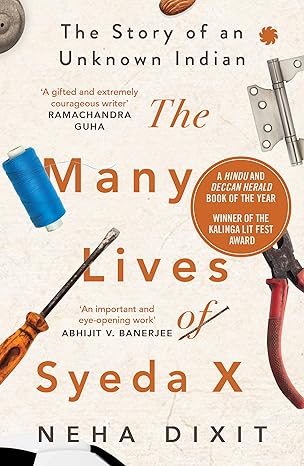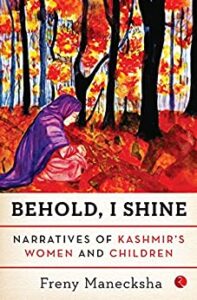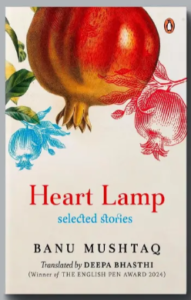Why I Picked This Book
I picked up The Many Lives of Syeda X after hearing it described as the story of an “unknown Indian woman.” That phrase stayed with me. Unknown, despite living and working in India for over three decades. Unknown, despite being the backbone of an economy that doesn’t even acknowledge her. It made me pause. How many such women do we walk past every day without noticing?
The Book
Neha Dixit’s book isn’t just a biography. It’s a portrait of a life most of us never see, because we haven’t looked closely enough. Through Syeda’s story, we meet a woman who has held over 50 informal jobs in her lifetime, some of which I had never even heard of. From shelling almonds to assembling lights, from sewing school bags to making passport photo booklets, Syeda’s hands have touched parts of everyday life we take for granted.
The book traces Syeda’s journey from her early years in Banaras to her adult life in Delhi. Along the way, we see her navigate poverty, communal tensions, domestic struggles, and systemic indifference. Her story isn’t one of big moments or dramatic events. It’s the kind of life that plays out in rented rooms, under flickering tube lights, across years of unpaid dues and ignored efforts. But that’s exactly how life is for most of our population, especially Muslims.
There is something deeply moving about how Dixit tells Syeda’s story. The writing is understated and never tries to romanticize her struggle. The tone is respectful and patient, letting Syeda’s reality speak for itself. We aren’t forced to pity her; instead, we come to admire her resilience, even as we ache for everything she is denied.
What stayed with me most was how Syeda kept going. Despite her circumstances, despite being underpaid and overworked, despite having her voice ignored repeatedly, she continues. She shows up. She works. She organises. She raises her children. She even leads a small strike with other women workers. Her resistance may not make headlines, but it’s there in her refusal to disappear.
Reading this reminded me of so many women I’ve seen—some who clean homes, others who sew in tailoring units or sell vegetables at street corners. You may not know their names, but their lives are stitched into ours. This book gave me a new lens through which to see them, not just as workers, but as women with complex lives, inner worlds, and stories worth listening to.
The author captures how Syeda’s life is shaped by events that many of us remember only as news: the communal riots in Banaras, the Babri Masjid demolition, demonetisation, and the Delhi riots of 2020. But for her, these weren’t just political shifts; they had direct consequences. A riot means a job lost. A policy change means wages are delayed. A label placed on her community means suspicion and fear. The personal is always political for women like Syeda, even when they have no say in the decisions being made.
One section that really struck me was about her daughter, Reshma. A bright student with dreams, she ends up leaving school and joining her mother in doing menial jobs to support the family. It felt like history repeating itself. How many dreams are crushed quietly, like this, and how many stories end before they even begin?
Dixit also captures the unspoken toll this life takes on a woman’s body and spirit. There’s a weariness in Syeda’s words as she grows older, a kind of quiet acceptance but also fatigue that creeps into her bones. And yet, even when she speaks of giving up, she never really does. There’s something profoundly brave in that.
The book doesn’t offer solutions. It doesn’t wrap Syeda’s life in a neat ending. There’s no big reward, no turning point. But maybe that’s the point. Not all lives end with closure or justice. Some just continue, day after day, through grit alone.
Reading The Many Lives of Syeda X was not easy. It was emotional and reminded me of the book Heart Lamp by Banu Mushtaq. It was infuriating at times. And it made me deeply uncomfortable to realise how little I knew about the invisible workforce that sustains this country. But it also made me grateful that someone took the time to tell this story, with honesty, with care, and without spectacle.
This book reminded me that survival, too, is an act of resistance. That quiet strength can be revolutionary. And that we owe it to women like Syeda—not just to read their stories, but to change the systems that keep them unseen.
Our Verdict
The Many Lives of Syeda X is an important book. It’s raw, it’s real, and it will stay with you long after you turn the last page. It isn’t just Syeda’s story—it’s the story of countless women whose lives remain unrecorded. If we’re lucky, more such stories will be written. And more importantly, read.
About the Author
Neha Dixit is an independent journalist based in New Delhi. She has covered politics, gender, and social justice for seventeen years. Most of her work is investigative, narrative, and long-form. She has reported for Al Jazeera, The Washington Post, The New York Times, The Caravan, The Wire, and other notable publications.
She has won over a dozen international and national journalism awards, including the One Young World Journalist of the Year Award 2020, the International Press Freedom Award 2019 from the Committee to Protect Journalists, the Chameli Devi Jain Award for Outstanding Woman Journalist 2017, the Kurt Schork Award in International Journalism 2014, the Lorenzo Natali Prize for Journalism 2011 from the European Commission, among others.


